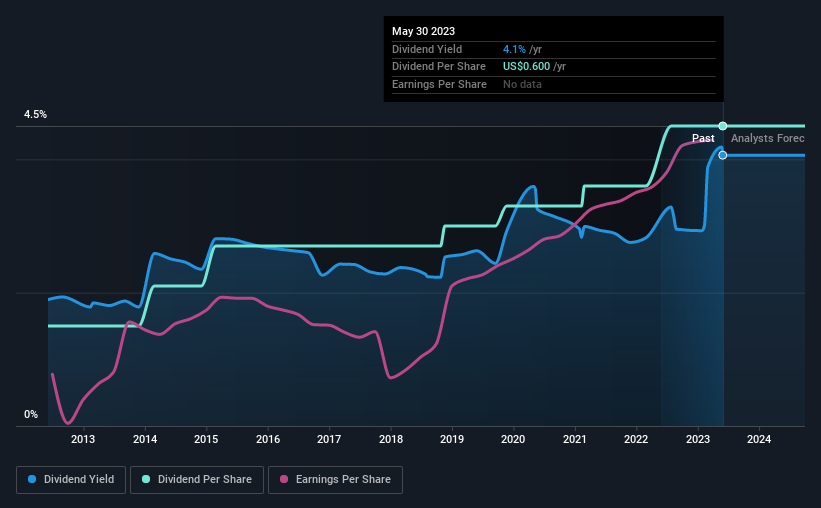ESSA Bancorp, Inc. (NASDAQ:ESSA) will pay a dividend of $0.15 on the 30th of June. Based on this payment, the dividend yield will be 4.1%, which is fairly typical for the industry.
See our latest analysis for ESSA Bancorp
ESSA Bancorp's Payment Expected To Have Solid Earnings Coverage
Solid dividend yields are great, but they only really help us if the payment is sustainable.
Having distributed dividends for at least 10 years, ESSA Bancorp has a long history of paying out a part of its earnings to shareholders. Past distributions do not necessarily guarantee future ones, but ESSA Bancorp's payout ratio of 29% is a good sign as this means that earnings decently cover dividends.
Over the next year, EPS is forecast to fall by 6.6%. But assuming the dividend continues along recent trends, we believe the future payout ratio could be 33%, which we are pretty comfortable with and we think would be feasible on an earnings basis.

ESSA Bancorp Has A Solid Track Record
Even over a long history of paying dividends, the company's distributions have been remarkably stable. The annual payment during the last 10 years was $0.20 in 2013, and the most recent fiscal year payment was $0.60. This implies that the company grew its distributions at a yearly rate of about 12% over that duration. So, dividends have been growing pretty quickly, and even more impressively, they haven't experienced any notable falls during this period.
The Dividend Looks Likely To Grow
Investors could be attracted to the stock based on the quality of its payment history. ESSA Bancorp has impressed us by growing EPS at 39% per year over the past five years. Earnings per share is growing at a solid clip, and the payout ratio is low which we think is an ideal combination in a dividend stock as the company can quite easily raise the dividend in the future.
We Really Like ESSA Bancorp's Dividend
Overall, we like to see the dividend staying consistent, and we think ESSA Bancorp might even raise payments in the future. The company is generating plenty of cash, and the earnings also quite easily cover the distributions. If earnings do fall over the next 12 months, the dividend could be buffeted a little bit, but we don't think it should cause too much of a problem in the long term. Taking this all into consideration, this looks like it could be a good dividend opportunity.
It's important to note that companies having a consistent dividend policy will generate greater investor confidence than those having an erratic one. Still, investors need to consider a host of other factors, apart from dividend payments, when analysing a company. For instance, we've picked out 1 warning sign for ESSA Bancorp that investors should take into consideration. Is ESSA Bancorp not quite the opportunity you were looking for? Why not check out our selection of top dividend stocks.
Valuation is complex, but we're here to simplify it.
Discover if ESSA Bancorp might be undervalued or overvalued with our detailed analysis, featuring fair value estimates, potential risks, dividends, insider trades, and its financial condition.
Access Free AnalysisHave feedback on this article? Concerned about the content? Get in touch with us directly. Alternatively, email editorial-team (at) simplywallst.com.
This article by Simply Wall St is general in nature. We provide commentary based on historical data and analyst forecasts only using an unbiased methodology and our articles are not intended to be financial advice. It does not constitute a recommendation to buy or sell any stock, and does not take account of your objectives, or your financial situation. We aim to bring you long-term focused analysis driven by fundamental data. Note that our analysis may not factor in the latest price-sensitive company announcements or qualitative material. Simply Wall St has no position in any stocks mentioned.
About NasdaqGS:ESSA
ESSA Bancorp
Operates as a bank holding company for ESSA Bank & Trust that provides a range of financial services to individuals, families, and businesses in Pennsylvania.
Flawless balance sheet average dividend payer.
Similar Companies
Market Insights
Community Narratives



